MOD005910 - Reflective Practice: Incident Analysis & Action Plan
VerifiedAdded on 2023/01/11
|11
|3544
|24
Report
AI Summary
This report provides an analysis of reflective practice within a healthcare context, focusing on the application of models such as Kolb's Experiential Learning Cycle and Gibbs' Reflective Cycle. It details a significant incident from a group work preparation, involving a presentation on patient health and wellbeing, where the student experienced nervousness and communication challenges. The report includes a reflective analysis of this incident, identifying areas for improvement in communication and teamwork skills. Finally, it outlines a SMART action plan for future development, emphasizing the importance of continuous learning and skill enhancement for healthcare professionals. Desklib offers a variety of similar solved assignments and resources for students.
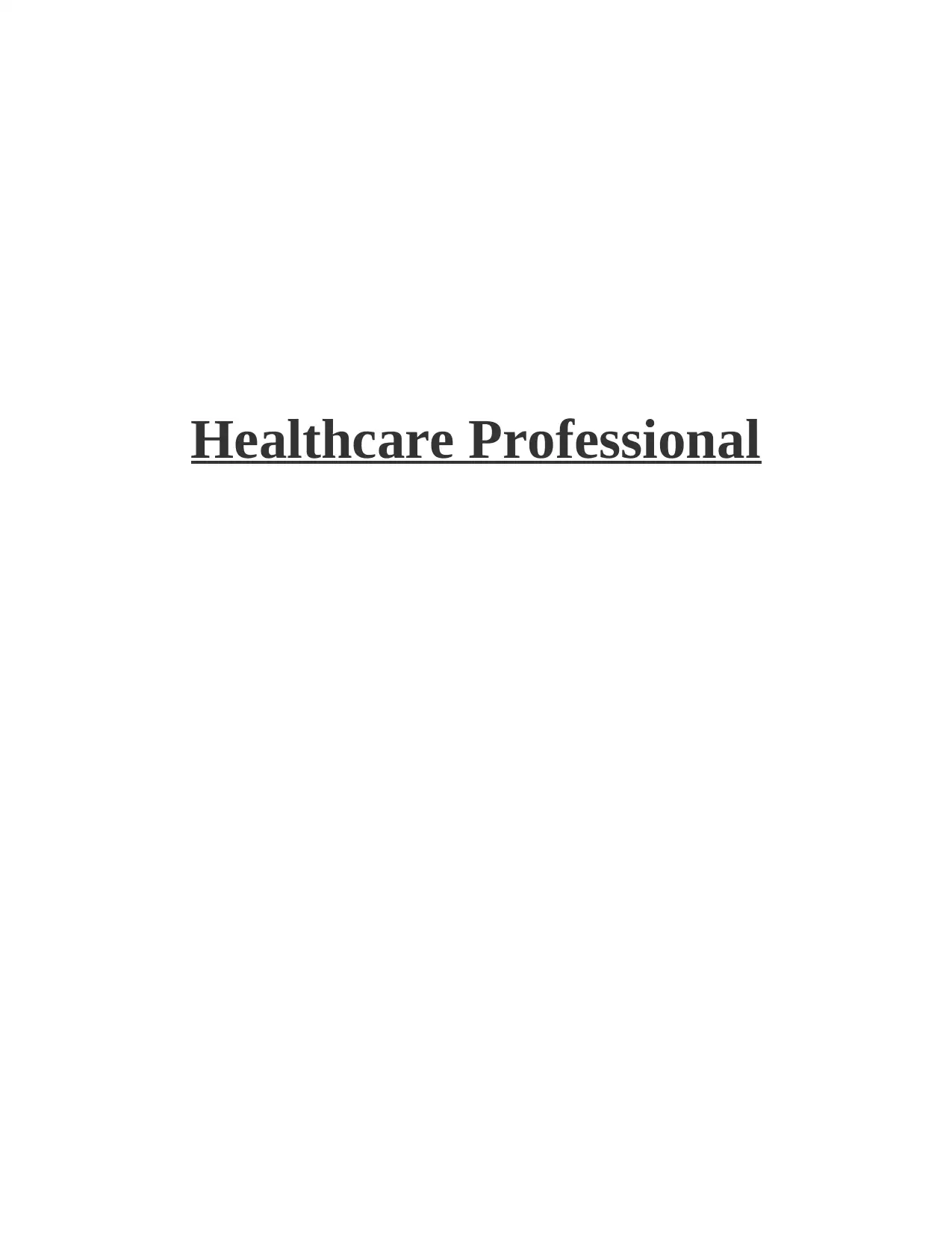
Healthcare Professional
Paraphrase This Document
Need a fresh take? Get an instant paraphrase of this document with our AI Paraphraser
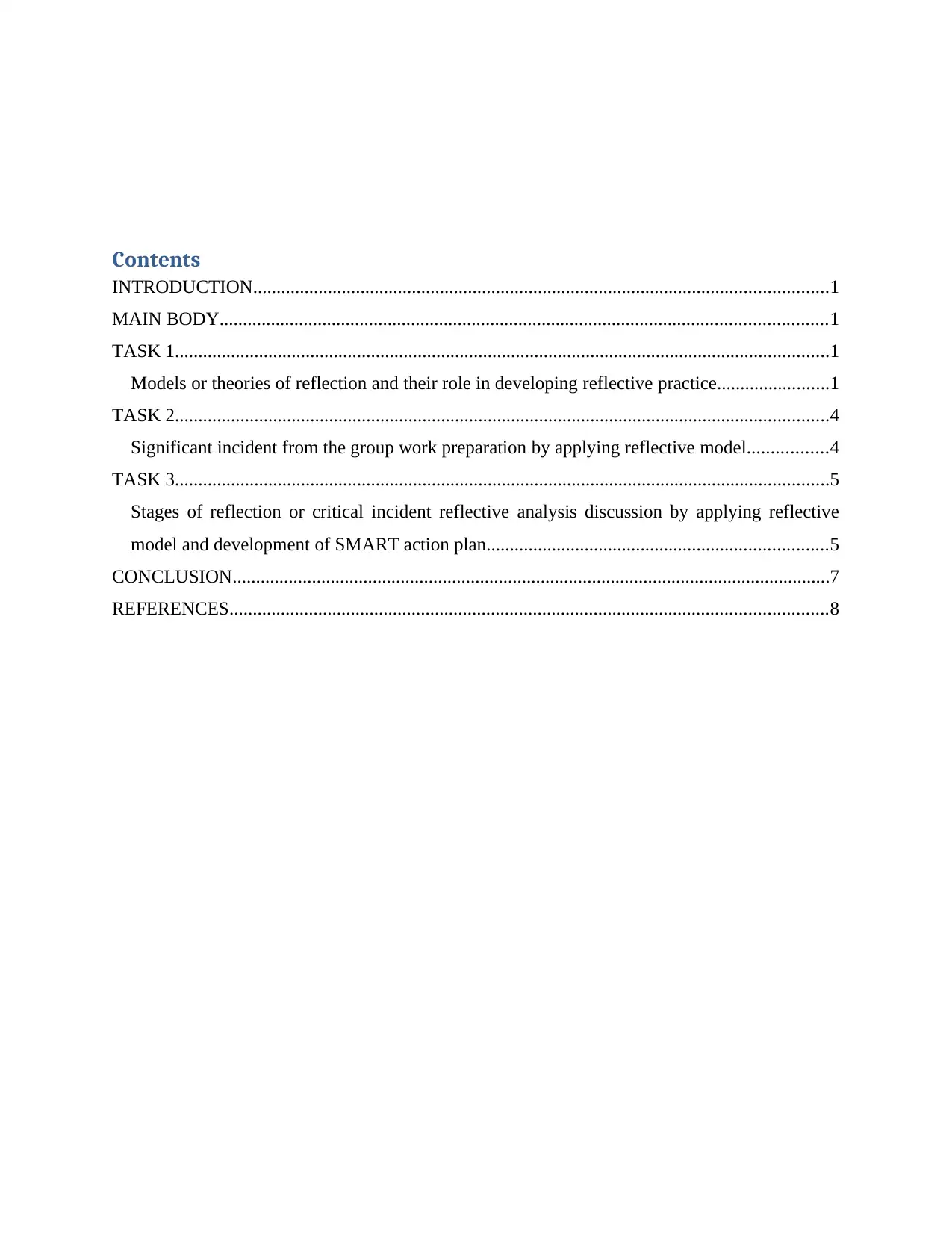
Contents
INTRODUCTION...........................................................................................................................1
MAIN BODY..................................................................................................................................1
TASK 1............................................................................................................................................1
Models or theories of reflection and their role in developing reflective practice........................1
TASK 2............................................................................................................................................4
Significant incident from the group work preparation by applying reflective model.................4
TASK 3............................................................................................................................................5
Stages of reflection or critical incident reflective analysis discussion by applying reflective
model and development of SMART action plan.........................................................................5
CONCLUSION................................................................................................................................7
REFERENCES................................................................................................................................8
INTRODUCTION...........................................................................................................................1
MAIN BODY..................................................................................................................................1
TASK 1............................................................................................................................................1
Models or theories of reflection and their role in developing reflective practice........................1
TASK 2............................................................................................................................................4
Significant incident from the group work preparation by applying reflective model.................4
TASK 3............................................................................................................................................5
Stages of reflection or critical incident reflective analysis discussion by applying reflective
model and development of SMART action plan.........................................................................5
CONCLUSION................................................................................................................................7
REFERENCES................................................................................................................................8
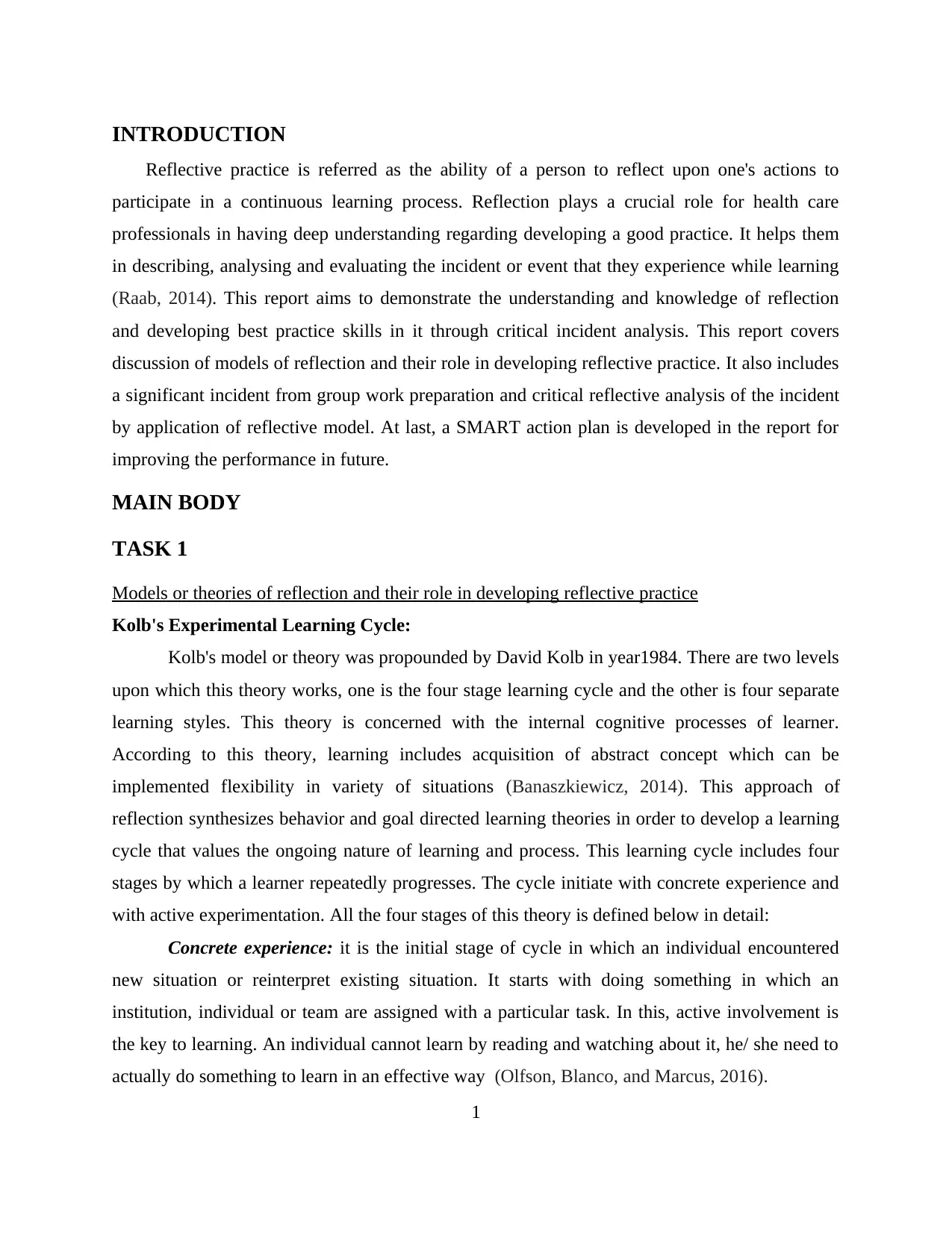
INTRODUCTION
Reflective practice is referred as the ability of a person to reflect upon one's actions to
participate in a continuous learning process. Reflection plays a crucial role for health care
professionals in having deep understanding regarding developing a good practice. It helps them
in describing, analysing and evaluating the incident or event that they experience while learning
(Raab, 2014). This report aims to demonstrate the understanding and knowledge of reflection
and developing best practice skills in it through critical incident analysis. This report covers
discussion of models of reflection and their role in developing reflective practice. It also includes
a significant incident from group work preparation and critical reflective analysis of the incident
by application of reflective model. At last, a SMART action plan is developed in the report for
improving the performance in future.
MAIN BODY
TASK 1
Models or theories of reflection and their role in developing reflective practice
Kolb's Experimental Learning Cycle:
Kolb's model or theory was propounded by David Kolb in year1984. There are two levels
upon which this theory works, one is the four stage learning cycle and the other is four separate
learning styles. This theory is concerned with the internal cognitive processes of learner.
According to this theory, learning includes acquisition of abstract concept which can be
implemented flexibility in variety of situations (Banaszkiewicz, 2014). This approach of
reflection synthesizes behavior and goal directed learning theories in order to develop a learning
cycle that values the ongoing nature of learning and process. This learning cycle includes four
stages by which a learner repeatedly progresses. The cycle initiate with concrete experience and
with active experimentation. All the four stages of this theory is defined below in detail:
Concrete experience: it is the initial stage of cycle in which an individual encountered
new situation or reinterpret existing situation. It starts with doing something in which an
institution, individual or team are assigned with a particular task. In this, active involvement is
the key to learning. An individual cannot learn by reading and watching about it, he/ she need to
actually do something to learn in an effective way (Olfson, Blanco, and Marcus, 2016).
1
Reflective practice is referred as the ability of a person to reflect upon one's actions to
participate in a continuous learning process. Reflection plays a crucial role for health care
professionals in having deep understanding regarding developing a good practice. It helps them
in describing, analysing and evaluating the incident or event that they experience while learning
(Raab, 2014). This report aims to demonstrate the understanding and knowledge of reflection
and developing best practice skills in it through critical incident analysis. This report covers
discussion of models of reflection and their role in developing reflective practice. It also includes
a significant incident from group work preparation and critical reflective analysis of the incident
by application of reflective model. At last, a SMART action plan is developed in the report for
improving the performance in future.
MAIN BODY
TASK 1
Models or theories of reflection and their role in developing reflective practice
Kolb's Experimental Learning Cycle:
Kolb's model or theory was propounded by David Kolb in year1984. There are two levels
upon which this theory works, one is the four stage learning cycle and the other is four separate
learning styles. This theory is concerned with the internal cognitive processes of learner.
According to this theory, learning includes acquisition of abstract concept which can be
implemented flexibility in variety of situations (Banaszkiewicz, 2014). This approach of
reflection synthesizes behavior and goal directed learning theories in order to develop a learning
cycle that values the ongoing nature of learning and process. This learning cycle includes four
stages by which a learner repeatedly progresses. The cycle initiate with concrete experience and
with active experimentation. All the four stages of this theory is defined below in detail:
Concrete experience: it is the initial stage of cycle in which an individual encountered
new situation or reinterpret existing situation. It starts with doing something in which an
institution, individual or team are assigned with a particular task. In this, active involvement is
the key to learning. An individual cannot learn by reading and watching about it, he/ she need to
actually do something to learn in an effective way (Olfson, Blanco, and Marcus, 2016).
1
⊘ This is a preview!⊘
Do you want full access?
Subscribe today to unlock all pages.

Trusted by 1+ million students worldwide
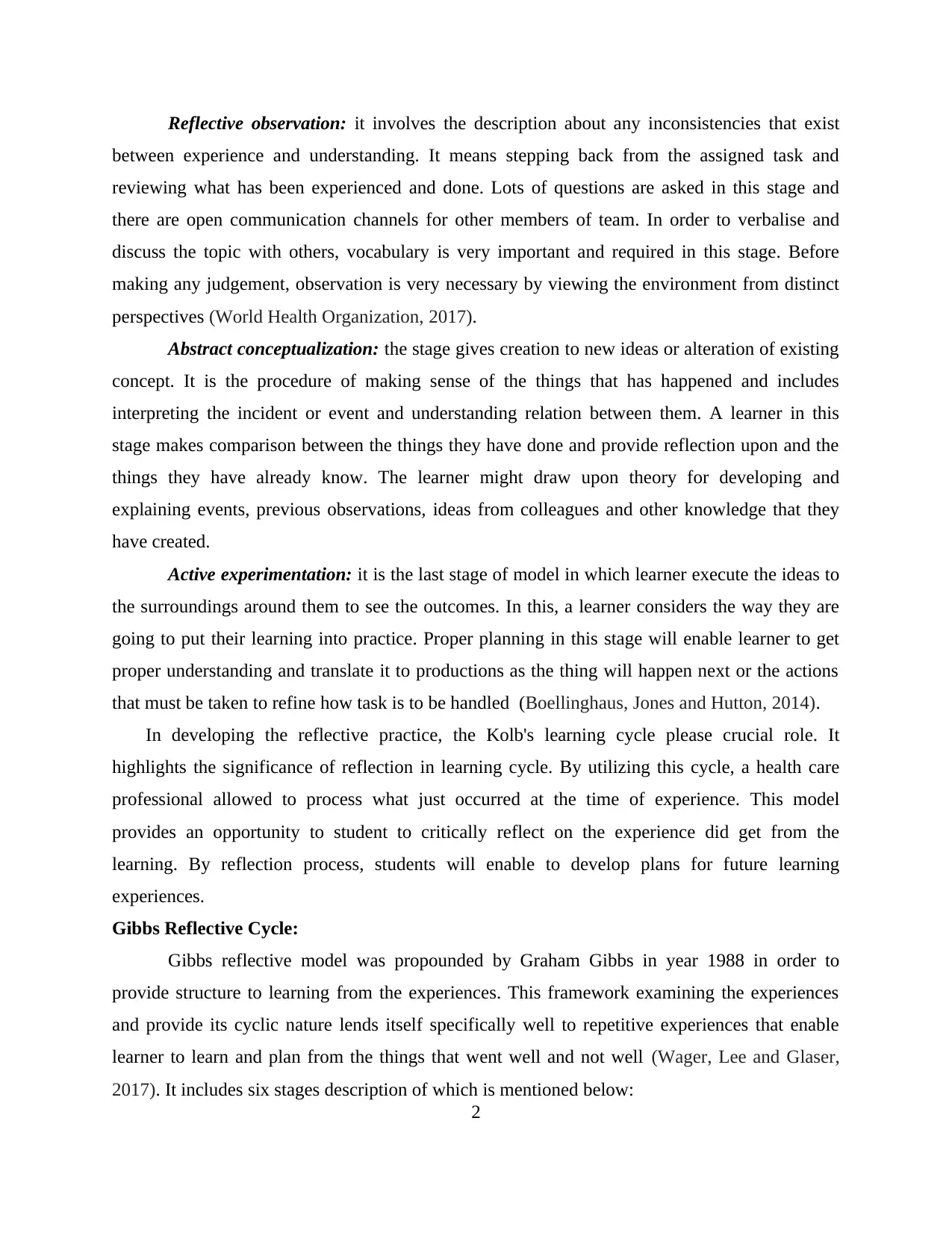
Reflective observation: it involves the description about any inconsistencies that exist
between experience and understanding. It means stepping back from the assigned task and
reviewing what has been experienced and done. Lots of questions are asked in this stage and
there are open communication channels for other members of team. In order to verbalise and
discuss the topic with others, vocabulary is very important and required in this stage. Before
making any judgement, observation is very necessary by viewing the environment from distinct
perspectives (World Health Organization, 2017).
Abstract conceptualization: the stage gives creation to new ideas or alteration of existing
concept. It is the procedure of making sense of the things that has happened and includes
interpreting the incident or event and understanding relation between them. A learner in this
stage makes comparison between the things they have done and provide reflection upon and the
things they have already know. The learner might draw upon theory for developing and
explaining events, previous observations, ideas from colleagues and other knowledge that they
have created.
Active experimentation: it is the last stage of model in which learner execute the ideas to
the surroundings around them to see the outcomes. In this, a learner considers the way they are
going to put their learning into practice. Proper planning in this stage will enable learner to get
proper understanding and translate it to productions as the thing will happen next or the actions
that must be taken to refine how task is to be handled (Boellinghaus, Jones and Hutton, 2014).
In developing the reflective practice, the Kolb's learning cycle please crucial role. It
highlights the significance of reflection in learning cycle. By utilizing this cycle, a health care
professional allowed to process what just occurred at the time of experience. This model
provides an opportunity to student to critically reflect on the experience did get from the
learning. By reflection process, students will enable to develop plans for future learning
experiences.
Gibbs Reflective Cycle:
Gibbs reflective model was propounded by Graham Gibbs in year 1988 in order to
provide structure to learning from the experiences. This framework examining the experiences
and provide its cyclic nature lends itself specifically well to repetitive experiences that enable
learner to learn and plan from the things that went well and not well (Wager, Lee and Glaser,
2017). It includes six stages description of which is mentioned below:
2
between experience and understanding. It means stepping back from the assigned task and
reviewing what has been experienced and done. Lots of questions are asked in this stage and
there are open communication channels for other members of team. In order to verbalise and
discuss the topic with others, vocabulary is very important and required in this stage. Before
making any judgement, observation is very necessary by viewing the environment from distinct
perspectives (World Health Organization, 2017).
Abstract conceptualization: the stage gives creation to new ideas or alteration of existing
concept. It is the procedure of making sense of the things that has happened and includes
interpreting the incident or event and understanding relation between them. A learner in this
stage makes comparison between the things they have done and provide reflection upon and the
things they have already know. The learner might draw upon theory for developing and
explaining events, previous observations, ideas from colleagues and other knowledge that they
have created.
Active experimentation: it is the last stage of model in which learner execute the ideas to
the surroundings around them to see the outcomes. In this, a learner considers the way they are
going to put their learning into practice. Proper planning in this stage will enable learner to get
proper understanding and translate it to productions as the thing will happen next or the actions
that must be taken to refine how task is to be handled (Boellinghaus, Jones and Hutton, 2014).
In developing the reflective practice, the Kolb's learning cycle please crucial role. It
highlights the significance of reflection in learning cycle. By utilizing this cycle, a health care
professional allowed to process what just occurred at the time of experience. This model
provides an opportunity to student to critically reflect on the experience did get from the
learning. By reflection process, students will enable to develop plans for future learning
experiences.
Gibbs Reflective Cycle:
Gibbs reflective model was propounded by Graham Gibbs in year 1988 in order to
provide structure to learning from the experiences. This framework examining the experiences
and provide its cyclic nature lends itself specifically well to repetitive experiences that enable
learner to learn and plan from the things that went well and not well (Wager, Lee and Glaser,
2017). It includes six stages description of which is mentioned below:
2
Paraphrase This Document
Need a fresh take? Get an instant paraphrase of this document with our AI Paraphraser
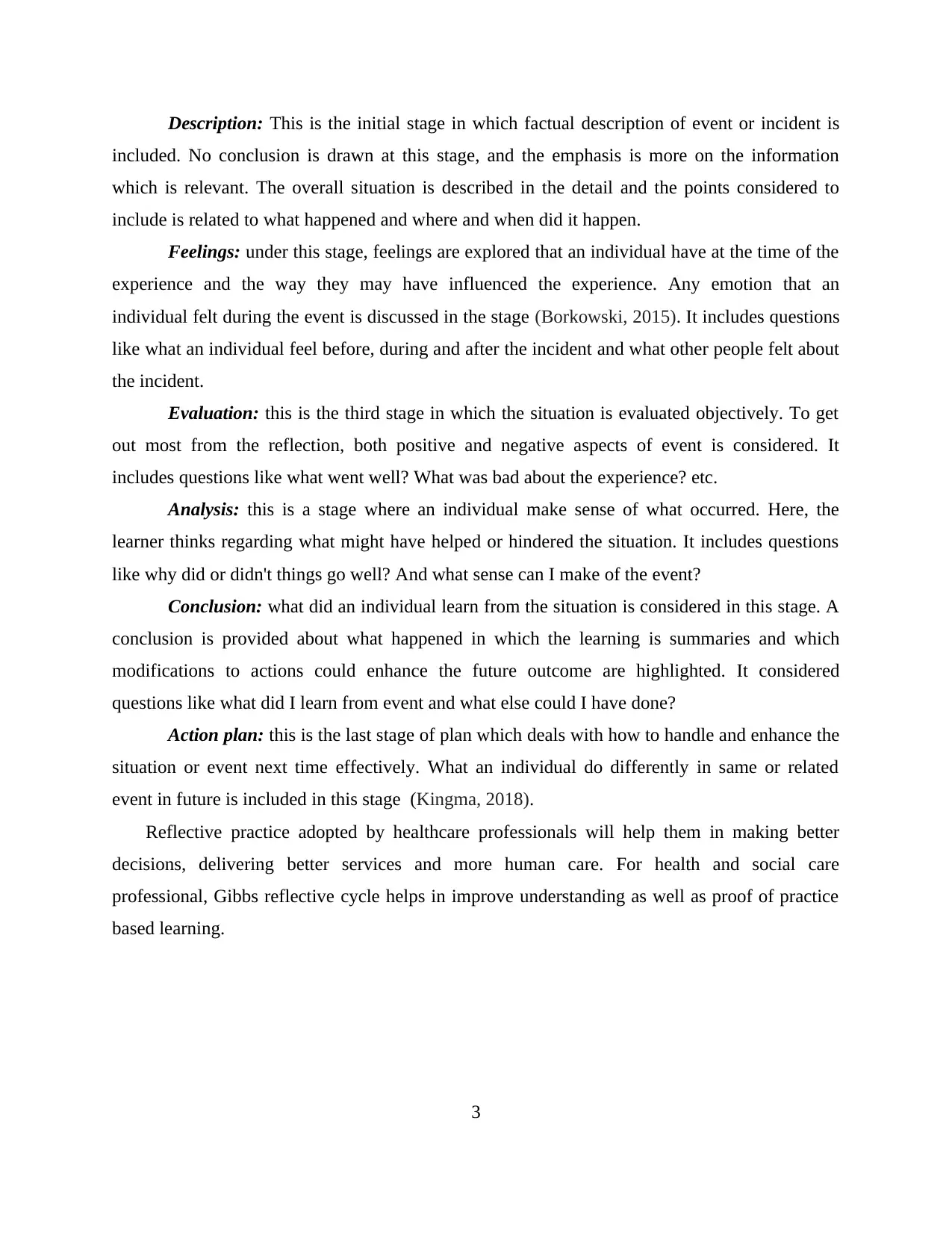
Description: This is the initial stage in which factual description of event or incident is
included. No conclusion is drawn at this stage, and the emphasis is more on the information
which is relevant. The overall situation is described in the detail and the points considered to
include is related to what happened and where and when did it happen.
Feelings: under this stage, feelings are explored that an individual have at the time of the
experience and the way they may have influenced the experience. Any emotion that an
individual felt during the event is discussed in the stage (Borkowski, 2015). It includes questions
like what an individual feel before, during and after the incident and what other people felt about
the incident.
Evaluation: this is the third stage in which the situation is evaluated objectively. To get
out most from the reflection, both positive and negative aspects of event is considered. It
includes questions like what went well? What was bad about the experience? etc.
Analysis: this is a stage where an individual make sense of what occurred. Here, the
learner thinks regarding what might have helped or hindered the situation. It includes questions
like why did or didn't things go well? And what sense can I make of the event?
Conclusion: what did an individual learn from the situation is considered in this stage. A
conclusion is provided about what happened in which the learning is summaries and which
modifications to actions could enhance the future outcome are highlighted. It considered
questions like what did I learn from event and what else could I have done?
Action plan: this is the last stage of plan which deals with how to handle and enhance the
situation or event next time effectively. What an individual do differently in same or related
event in future is included in this stage (Kingma, 2018).
Reflective practice adopted by healthcare professionals will help them in making better
decisions, delivering better services and more human care. For health and social care
professional, Gibbs reflective cycle helps in improve understanding as well as proof of practice
based learning.
3
included. No conclusion is drawn at this stage, and the emphasis is more on the information
which is relevant. The overall situation is described in the detail and the points considered to
include is related to what happened and where and when did it happen.
Feelings: under this stage, feelings are explored that an individual have at the time of the
experience and the way they may have influenced the experience. Any emotion that an
individual felt during the event is discussed in the stage (Borkowski, 2015). It includes questions
like what an individual feel before, during and after the incident and what other people felt about
the incident.
Evaluation: this is the third stage in which the situation is evaluated objectively. To get
out most from the reflection, both positive and negative aspects of event is considered. It
includes questions like what went well? What was bad about the experience? etc.
Analysis: this is a stage where an individual make sense of what occurred. Here, the
learner thinks regarding what might have helped or hindered the situation. It includes questions
like why did or didn't things go well? And what sense can I make of the event?
Conclusion: what did an individual learn from the situation is considered in this stage. A
conclusion is provided about what happened in which the learning is summaries and which
modifications to actions could enhance the future outcome are highlighted. It considered
questions like what did I learn from event and what else could I have done?
Action plan: this is the last stage of plan which deals with how to handle and enhance the
situation or event next time effectively. What an individual do differently in same or related
event in future is included in this stage (Kingma, 2018).
Reflective practice adopted by healthcare professionals will help them in making better
decisions, delivering better services and more human care. For health and social care
professional, Gibbs reflective cycle helps in improve understanding as well as proof of practice
based learning.
3
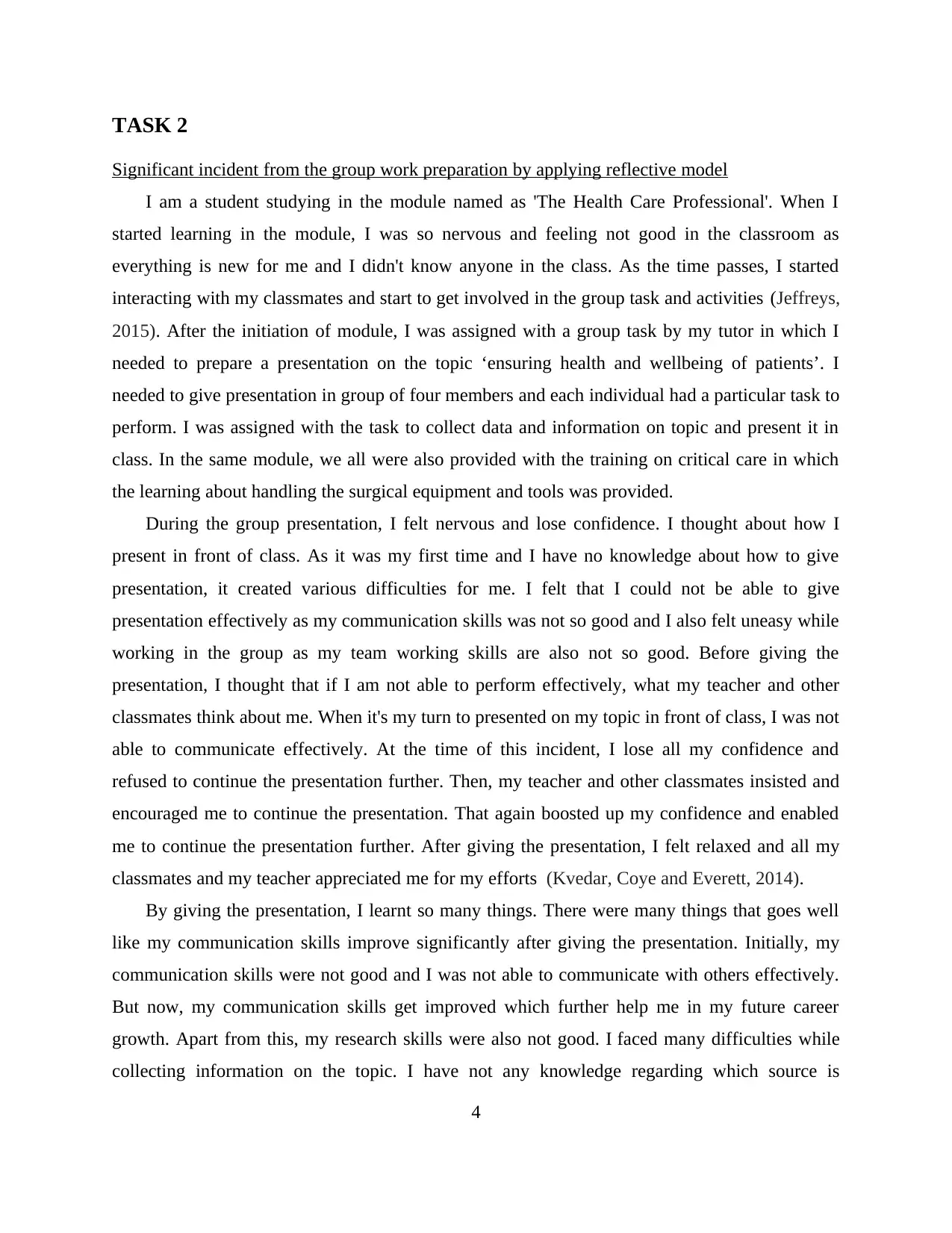
TASK 2
Significant incident from the group work preparation by applying reflective model
I am a student studying in the module named as 'The Health Care Professional'. When I
started learning in the module, I was so nervous and feeling not good in the classroom as
everything is new for me and I didn't know anyone in the class. As the time passes, I started
interacting with my classmates and start to get involved in the group task and activities (Jeffreys,
2015). After the initiation of module, I was assigned with a group task by my tutor in which I
needed to prepare a presentation on the topic ‘ensuring health and wellbeing of patients’. I
needed to give presentation in group of four members and each individual had a particular task to
perform. I was assigned with the task to collect data and information on topic and present it in
class. In the same module, we all were also provided with the training on critical care in which
the learning about handling the surgical equipment and tools was provided.
During the group presentation, I felt nervous and lose confidence. I thought about how I
present in front of class. As it was my first time and I have no knowledge about how to give
presentation, it created various difficulties for me. I felt that I could not be able to give
presentation effectively as my communication skills was not so good and I also felt uneasy while
working in the group as my team working skills are also not so good. Before giving the
presentation, I thought that if I am not able to perform effectively, what my teacher and other
classmates think about me. When it's my turn to presented on my topic in front of class, I was not
able to communicate effectively. At the time of this incident, I lose all my confidence and
refused to continue the presentation further. Then, my teacher and other classmates insisted and
encouraged me to continue the presentation. That again boosted up my confidence and enabled
me to continue the presentation further. After giving the presentation, I felt relaxed and all my
classmates and my teacher appreciated me for my efforts (Kvedar, Coye and Everett, 2014).
By giving the presentation, I learnt so many things. There were many things that goes well
like my communication skills improve significantly after giving the presentation. Initially, my
communication skills were not good and I was not able to communicate with others effectively.
But now, my communication skills get improved which further help me in my future career
growth. Apart from this, my research skills were also not good. I faced many difficulties while
collecting information on the topic. I have not any knowledge regarding which source is
4
Significant incident from the group work preparation by applying reflective model
I am a student studying in the module named as 'The Health Care Professional'. When I
started learning in the module, I was so nervous and feeling not good in the classroom as
everything is new for me and I didn't know anyone in the class. As the time passes, I started
interacting with my classmates and start to get involved in the group task and activities (Jeffreys,
2015). After the initiation of module, I was assigned with a group task by my tutor in which I
needed to prepare a presentation on the topic ‘ensuring health and wellbeing of patients’. I
needed to give presentation in group of four members and each individual had a particular task to
perform. I was assigned with the task to collect data and information on topic and present it in
class. In the same module, we all were also provided with the training on critical care in which
the learning about handling the surgical equipment and tools was provided.
During the group presentation, I felt nervous and lose confidence. I thought about how I
present in front of class. As it was my first time and I have no knowledge about how to give
presentation, it created various difficulties for me. I felt that I could not be able to give
presentation effectively as my communication skills was not so good and I also felt uneasy while
working in the group as my team working skills are also not so good. Before giving the
presentation, I thought that if I am not able to perform effectively, what my teacher and other
classmates think about me. When it's my turn to presented on my topic in front of class, I was not
able to communicate effectively. At the time of this incident, I lose all my confidence and
refused to continue the presentation further. Then, my teacher and other classmates insisted and
encouraged me to continue the presentation. That again boosted up my confidence and enabled
me to continue the presentation further. After giving the presentation, I felt relaxed and all my
classmates and my teacher appreciated me for my efforts (Kvedar, Coye and Everett, 2014).
By giving the presentation, I learnt so many things. There were many things that goes well
like my communication skills improve significantly after giving the presentation. Initially, my
communication skills were not good and I was not able to communicate with others effectively.
But now, my communication skills get improved which further help me in my future career
growth. Apart from this, my research skills were also not good. I faced many difficulties while
collecting information on the topic. I have not any knowledge regarding which source is
4
⊘ This is a preview!⊘
Do you want full access?
Subscribe today to unlock all pages.

Trusted by 1+ million students worldwide
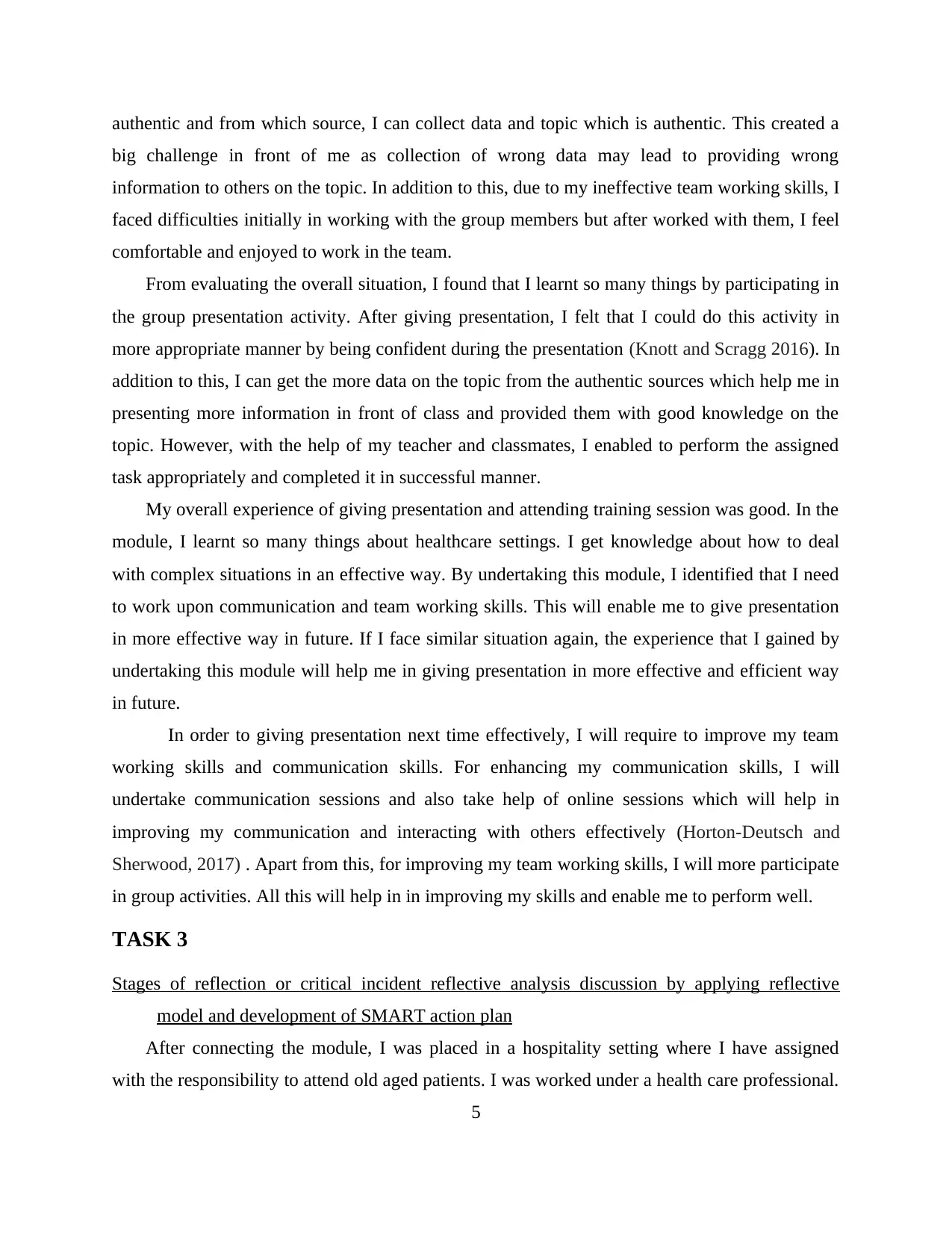
authentic and from which source, I can collect data and topic which is authentic. This created a
big challenge in front of me as collection of wrong data may lead to providing wrong
information to others on the topic. In addition to this, due to my ineffective team working skills, I
faced difficulties initially in working with the group members but after worked with them, I feel
comfortable and enjoyed to work in the team.
From evaluating the overall situation, I found that I learnt so many things by participating in
the group presentation activity. After giving presentation, I felt that I could do this activity in
more appropriate manner by being confident during the presentation (Knott and Scragg 2016). In
addition to this, I can get the more data on the topic from the authentic sources which help me in
presenting more information in front of class and provided them with good knowledge on the
topic. However, with the help of my teacher and classmates, I enabled to perform the assigned
task appropriately and completed it in successful manner.
My overall experience of giving presentation and attending training session was good. In the
module, I learnt so many things about healthcare settings. I get knowledge about how to deal
with complex situations in an effective way. By undertaking this module, I identified that I need
to work upon communication and team working skills. This will enable me to give presentation
in more effective way in future. If I face similar situation again, the experience that I gained by
undertaking this module will help me in giving presentation in more effective and efficient way
in future.
In order to giving presentation next time effectively, I will require to improve my team
working skills and communication skills. For enhancing my communication skills, I will
undertake communication sessions and also take help of online sessions which will help in
improving my communication and interacting with others effectively (Horton-Deutsch and
Sherwood, 2017) . Apart from this, for improving my team working skills, I will more participate
in group activities. All this will help in in improving my skills and enable me to perform well.
TASK 3
Stages of reflection or critical incident reflective analysis discussion by applying reflective
model and development of SMART action plan
After connecting the module, I was placed in a hospitality setting where I have assigned
with the responsibility to attend old aged patients. I was worked under a health care professional.
5
big challenge in front of me as collection of wrong data may lead to providing wrong
information to others on the topic. In addition to this, due to my ineffective team working skills, I
faced difficulties initially in working with the group members but after worked with them, I feel
comfortable and enjoyed to work in the team.
From evaluating the overall situation, I found that I learnt so many things by participating in
the group presentation activity. After giving presentation, I felt that I could do this activity in
more appropriate manner by being confident during the presentation (Knott and Scragg 2016). In
addition to this, I can get the more data on the topic from the authentic sources which help me in
presenting more information in front of class and provided them with good knowledge on the
topic. However, with the help of my teacher and classmates, I enabled to perform the assigned
task appropriately and completed it in successful manner.
My overall experience of giving presentation and attending training session was good. In the
module, I learnt so many things about healthcare settings. I get knowledge about how to deal
with complex situations in an effective way. By undertaking this module, I identified that I need
to work upon communication and team working skills. This will enable me to give presentation
in more effective way in future. If I face similar situation again, the experience that I gained by
undertaking this module will help me in giving presentation in more effective and efficient way
in future.
In order to giving presentation next time effectively, I will require to improve my team
working skills and communication skills. For enhancing my communication skills, I will
undertake communication sessions and also take help of online sessions which will help in
improving my communication and interacting with others effectively (Horton-Deutsch and
Sherwood, 2017) . Apart from this, for improving my team working skills, I will more participate
in group activities. All this will help in in improving my skills and enable me to perform well.
TASK 3
Stages of reflection or critical incident reflective analysis discussion by applying reflective
model and development of SMART action plan
After connecting the module, I was placed in a hospitality setting where I have assigned
with the responsibility to attend old aged patients. I was worked under a health care professional.
5
Paraphrase This Document
Need a fresh take? Get an instant paraphrase of this document with our AI Paraphraser
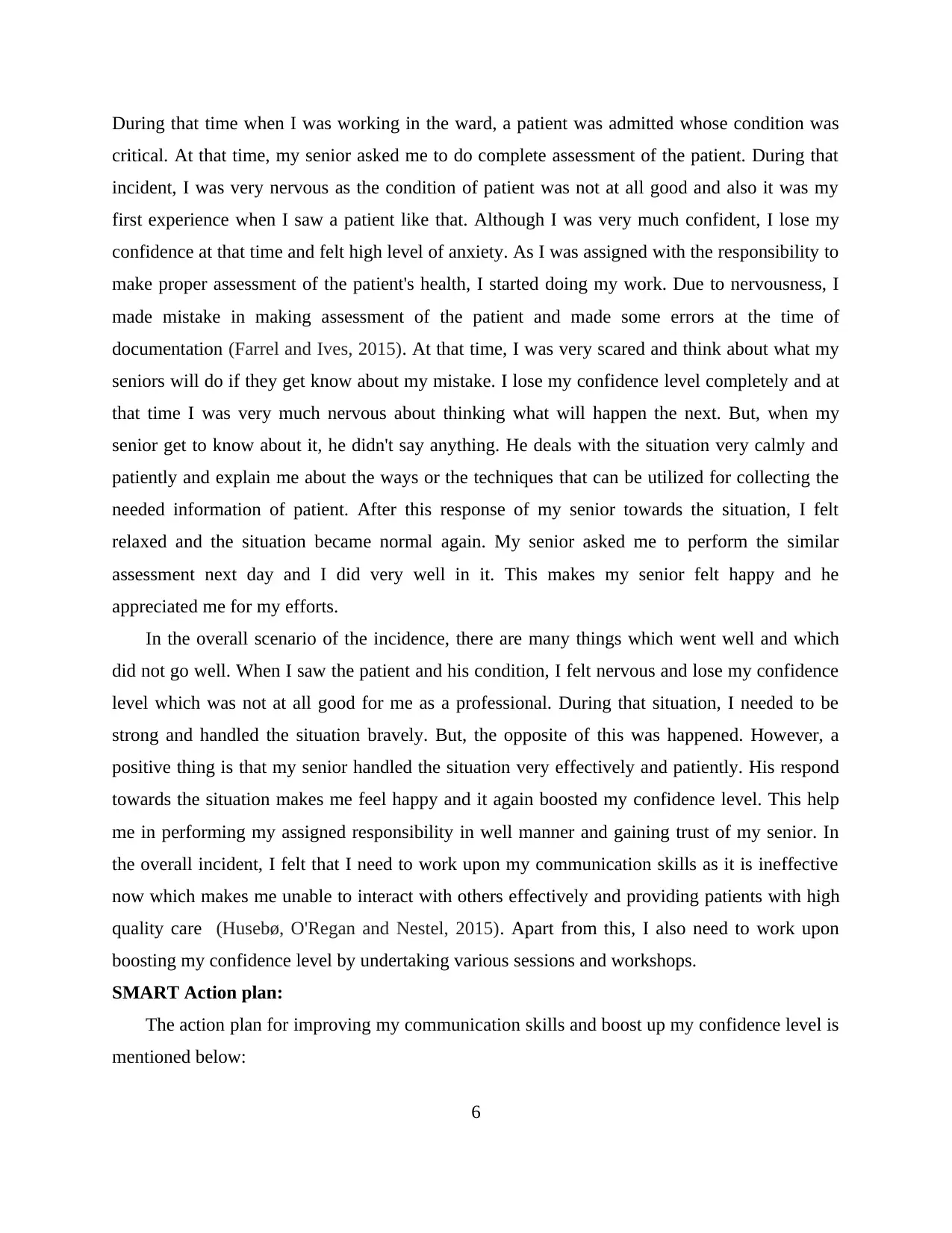
During that time when I was working in the ward, a patient was admitted whose condition was
critical. At that time, my senior asked me to do complete assessment of the patient. During that
incident, I was very nervous as the condition of patient was not at all good and also it was my
first experience when I saw a patient like that. Although I was very much confident, I lose my
confidence at that time and felt high level of anxiety. As I was assigned with the responsibility to
make proper assessment of the patient's health, I started doing my work. Due to nervousness, I
made mistake in making assessment of the patient and made some errors at the time of
documentation (Farrel and Ives, 2015). At that time, I was very scared and think about what my
seniors will do if they get know about my mistake. I lose my confidence level completely and at
that time I was very much nervous about thinking what will happen the next. But, when my
senior get to know about it, he didn't say anything. He deals with the situation very calmly and
patiently and explain me about the ways or the techniques that can be utilized for collecting the
needed information of patient. After this response of my senior towards the situation, I felt
relaxed and the situation became normal again. My senior asked me to perform the similar
assessment next day and I did very well in it. This makes my senior felt happy and he
appreciated me for my efforts.
In the overall scenario of the incidence, there are many things which went well and which
did not go well. When I saw the patient and his condition, I felt nervous and lose my confidence
level which was not at all good for me as a professional. During that situation, I needed to be
strong and handled the situation bravely. But, the opposite of this was happened. However, a
positive thing is that my senior handled the situation very effectively and patiently. His respond
towards the situation makes me feel happy and it again boosted my confidence level. This help
me in performing my assigned responsibility in well manner and gaining trust of my senior. In
the overall incident, I felt that I need to work upon my communication skills as it is ineffective
now which makes me unable to interact with others effectively and providing patients with high
quality care (Husebø, O'Regan and Nestel, 2015). Apart from this, I also need to work upon
boosting my confidence level by undertaking various sessions and workshops.
SMART Action plan:
The action plan for improving my communication skills and boost up my confidence level is
mentioned below:
6
critical. At that time, my senior asked me to do complete assessment of the patient. During that
incident, I was very nervous as the condition of patient was not at all good and also it was my
first experience when I saw a patient like that. Although I was very much confident, I lose my
confidence at that time and felt high level of anxiety. As I was assigned with the responsibility to
make proper assessment of the patient's health, I started doing my work. Due to nervousness, I
made mistake in making assessment of the patient and made some errors at the time of
documentation (Farrel and Ives, 2015). At that time, I was very scared and think about what my
seniors will do if they get know about my mistake. I lose my confidence level completely and at
that time I was very much nervous about thinking what will happen the next. But, when my
senior get to know about it, he didn't say anything. He deals with the situation very calmly and
patiently and explain me about the ways or the techniques that can be utilized for collecting the
needed information of patient. After this response of my senior towards the situation, I felt
relaxed and the situation became normal again. My senior asked me to perform the similar
assessment next day and I did very well in it. This makes my senior felt happy and he
appreciated me for my efforts.
In the overall scenario of the incidence, there are many things which went well and which
did not go well. When I saw the patient and his condition, I felt nervous and lose my confidence
level which was not at all good for me as a professional. During that situation, I needed to be
strong and handled the situation bravely. But, the opposite of this was happened. However, a
positive thing is that my senior handled the situation very effectively and patiently. His respond
towards the situation makes me feel happy and it again boosted my confidence level. This help
me in performing my assigned responsibility in well manner and gaining trust of my senior. In
the overall incident, I felt that I need to work upon my communication skills as it is ineffective
now which makes me unable to interact with others effectively and providing patients with high
quality care (Husebø, O'Regan and Nestel, 2015). Apart from this, I also need to work upon
boosting my confidence level by undertaking various sessions and workshops.
SMART Action plan:
The action plan for improving my communication skills and boost up my confidence level is
mentioned below:
6
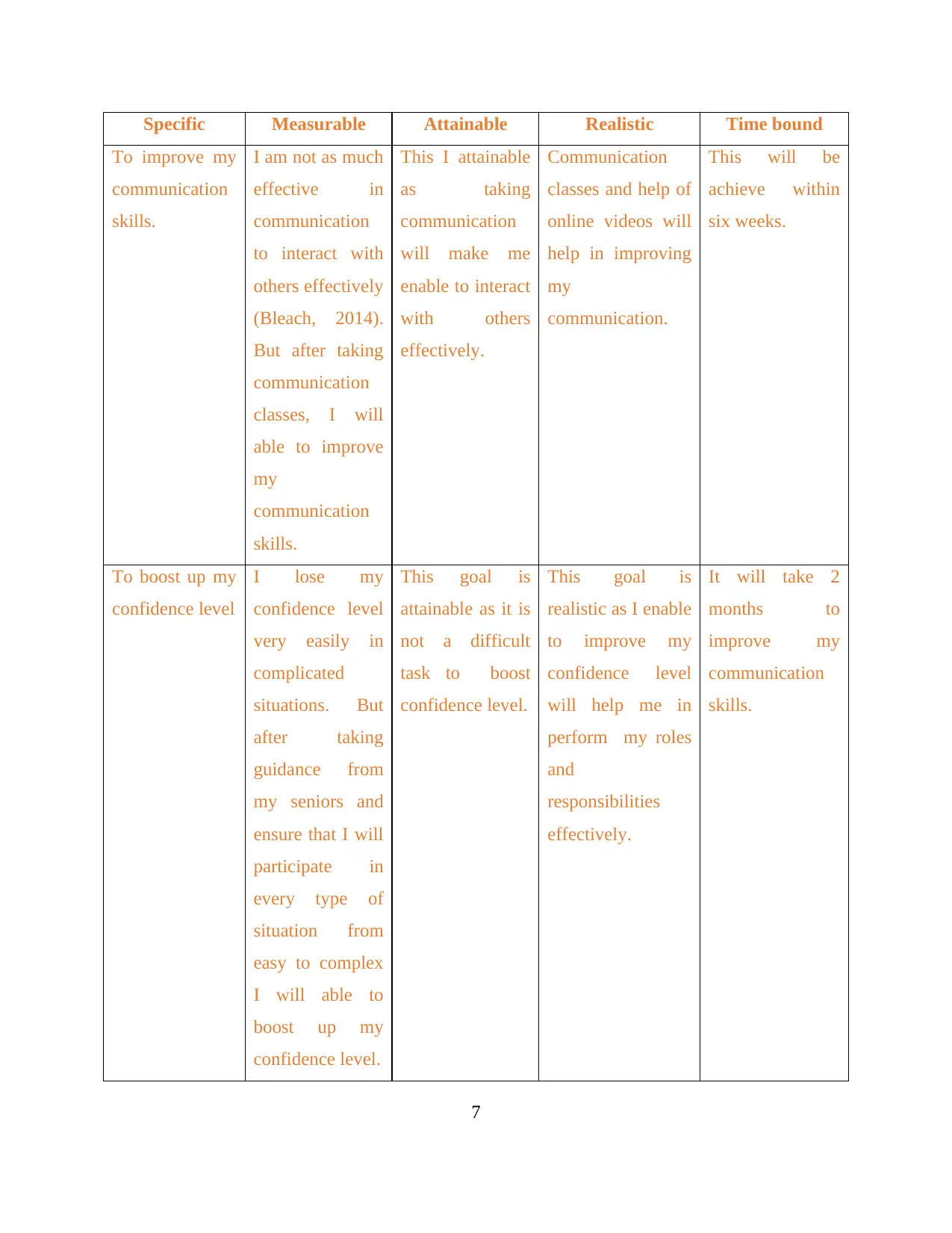
Specific Measurable Attainable Realistic Time bound
To improve my
communication
skills.
I am not as much
effective in
communication
to interact with
others effectively
(Bleach, 2014).
But after taking
communication
classes, I will
able to improve
my
communication
skills.
This I attainable
as taking
communication
will make me
enable to interact
with others
effectively.
Communication
classes and help of
online videos will
help in improving
my
communication.
This will be
achieve within
six weeks.
To boost up my
confidence level
I lose my
confidence level
very easily in
complicated
situations. But
after taking
guidance from
my seniors and
ensure that I will
participate in
every type of
situation from
easy to complex
I will able to
boost up my
confidence level.
This goal is
attainable as it is
not a difficult
task to boost
confidence level.
This goal is
realistic as I enable
to improve my
confidence level
will help me in
perform my roles
and
responsibilities
effectively.
It will take 2
months to
improve my
communication
skills.
7
To improve my
communication
skills.
I am not as much
effective in
communication
to interact with
others effectively
(Bleach, 2014).
But after taking
communication
classes, I will
able to improve
my
communication
skills.
This I attainable
as taking
communication
will make me
enable to interact
with others
effectively.
Communication
classes and help of
online videos will
help in improving
my
communication.
This will be
achieve within
six weeks.
To boost up my
confidence level
I lose my
confidence level
very easily in
complicated
situations. But
after taking
guidance from
my seniors and
ensure that I will
participate in
every type of
situation from
easy to complex
I will able to
boost up my
confidence level.
This goal is
attainable as it is
not a difficult
task to boost
confidence level.
This goal is
realistic as I enable
to improve my
confidence level
will help me in
perform my roles
and
responsibilities
effectively.
It will take 2
months to
improve my
communication
skills.
7
⊘ This is a preview!⊘
Do you want full access?
Subscribe today to unlock all pages.

Trusted by 1+ million students worldwide
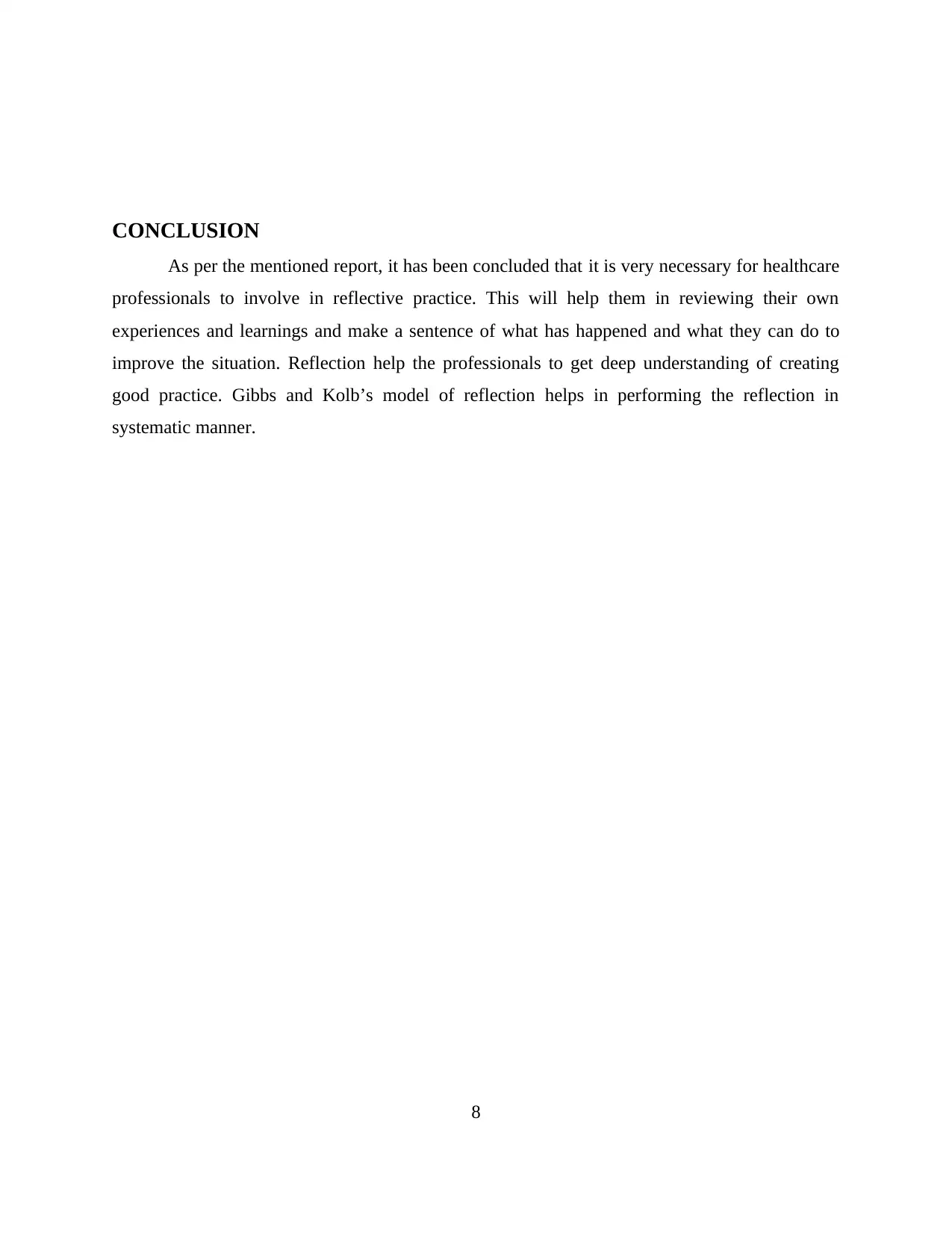
CONCLUSION
As per the mentioned report, it has been concluded that it is very necessary for healthcare
professionals to involve in reflective practice. This will help them in reviewing their own
experiences and learnings and make a sentence of what has happened and what they can do to
improve the situation. Reflection help the professionals to get deep understanding of creating
good practice. Gibbs and Kolb’s model of reflection helps in performing the reflection in
systematic manner.
8
As per the mentioned report, it has been concluded that it is very necessary for healthcare
professionals to involve in reflective practice. This will help them in reviewing their own
experiences and learnings and make a sentence of what has happened and what they can do to
improve the situation. Reflection help the professionals to get deep understanding of creating
good practice. Gibbs and Kolb’s model of reflection helps in performing the reflection in
systematic manner.
8
Paraphrase This Document
Need a fresh take? Get an instant paraphrase of this document with our AI Paraphraser
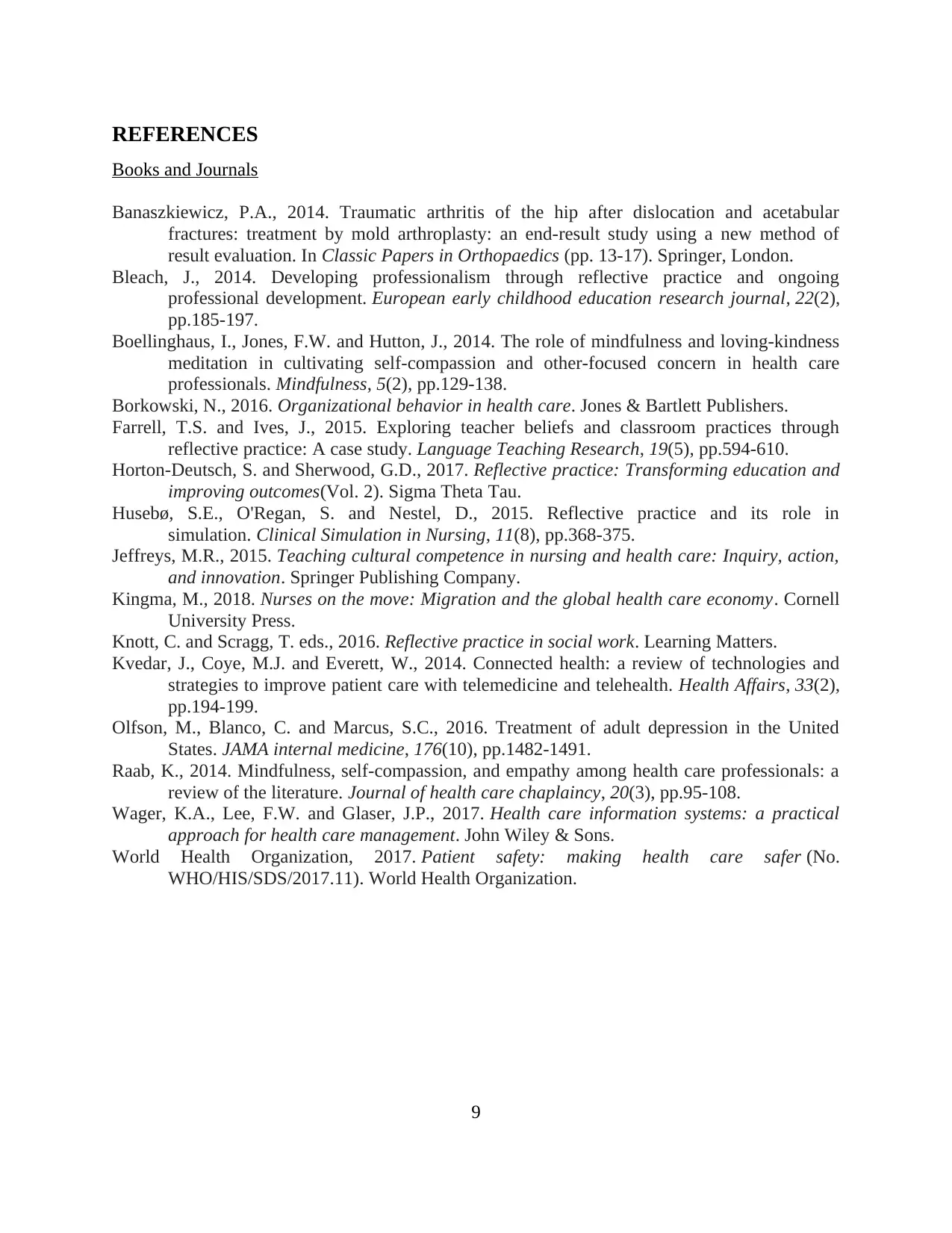
REFERENCES
Books and Journals
Banaszkiewicz, P.A., 2014. Traumatic arthritis of the hip after dislocation and acetabular
fractures: treatment by mold arthroplasty: an end-result study using a new method of
result evaluation. In Classic Papers in Orthopaedics (pp. 13-17). Springer, London.
Bleach, J., 2014. Developing professionalism through reflective practice and ongoing
professional development. European early childhood education research journal, 22(2),
pp.185-197.
Boellinghaus, I., Jones, F.W. and Hutton, J., 2014. The role of mindfulness and loving-kindness
meditation in cultivating self-compassion and other-focused concern in health care
professionals. Mindfulness, 5(2), pp.129-138.
Borkowski, N., 2016. Organizational behavior in health care. Jones & Bartlett Publishers.
Farrell, T.S. and Ives, J., 2015. Exploring teacher beliefs and classroom practices through
reflective practice: A case study. Language Teaching Research, 19(5), pp.594-610.
Horton-Deutsch, S. and Sherwood, G.D., 2017. Reflective practice: Transforming education and
improving outcomes(Vol. 2). Sigma Theta Tau.
Husebø, S.E., O'Regan, S. and Nestel, D., 2015. Reflective practice and its role in
simulation. Clinical Simulation in Nursing, 11(8), pp.368-375.
Jeffreys, M.R., 2015. Teaching cultural competence in nursing and health care: Inquiry, action,
and innovation. Springer Publishing Company.
Kingma, M., 2018. Nurses on the move: Migration and the global health care economy. Cornell
University Press.
Knott, C. and Scragg, T. eds., 2016. Reflective practice in social work. Learning Matters.
Kvedar, J., Coye, M.J. and Everett, W., 2014. Connected health: a review of technologies and
strategies to improve patient care with telemedicine and telehealth. Health Affairs, 33(2),
pp.194-199.
Olfson, M., Blanco, C. and Marcus, S.C., 2016. Treatment of adult depression in the United
States. JAMA internal medicine, 176(10), pp.1482-1491.
Raab, K., 2014. Mindfulness, self-compassion, and empathy among health care professionals: a
review of the literature. Journal of health care chaplaincy, 20(3), pp.95-108.
Wager, K.A., Lee, F.W. and Glaser, J.P., 2017. Health care information systems: a practical
approach for health care management. John Wiley & Sons.
World Health Organization, 2017. Patient safety: making health care safer (No.
WHO/HIS/SDS/2017.11). World Health Organization.
9
Books and Journals
Banaszkiewicz, P.A., 2014. Traumatic arthritis of the hip after dislocation and acetabular
fractures: treatment by mold arthroplasty: an end-result study using a new method of
result evaluation. In Classic Papers in Orthopaedics (pp. 13-17). Springer, London.
Bleach, J., 2014. Developing professionalism through reflective practice and ongoing
professional development. European early childhood education research journal, 22(2),
pp.185-197.
Boellinghaus, I., Jones, F.W. and Hutton, J., 2014. The role of mindfulness and loving-kindness
meditation in cultivating self-compassion and other-focused concern in health care
professionals. Mindfulness, 5(2), pp.129-138.
Borkowski, N., 2016. Organizational behavior in health care. Jones & Bartlett Publishers.
Farrell, T.S. and Ives, J., 2015. Exploring teacher beliefs and classroom practices through
reflective practice: A case study. Language Teaching Research, 19(5), pp.594-610.
Horton-Deutsch, S. and Sherwood, G.D., 2017. Reflective practice: Transforming education and
improving outcomes(Vol. 2). Sigma Theta Tau.
Husebø, S.E., O'Regan, S. and Nestel, D., 2015. Reflective practice and its role in
simulation. Clinical Simulation in Nursing, 11(8), pp.368-375.
Jeffreys, M.R., 2015. Teaching cultural competence in nursing and health care: Inquiry, action,
and innovation. Springer Publishing Company.
Kingma, M., 2018. Nurses on the move: Migration and the global health care economy. Cornell
University Press.
Knott, C. and Scragg, T. eds., 2016. Reflective practice in social work. Learning Matters.
Kvedar, J., Coye, M.J. and Everett, W., 2014. Connected health: a review of technologies and
strategies to improve patient care with telemedicine and telehealth. Health Affairs, 33(2),
pp.194-199.
Olfson, M., Blanco, C. and Marcus, S.C., 2016. Treatment of adult depression in the United
States. JAMA internal medicine, 176(10), pp.1482-1491.
Raab, K., 2014. Mindfulness, self-compassion, and empathy among health care professionals: a
review of the literature. Journal of health care chaplaincy, 20(3), pp.95-108.
Wager, K.A., Lee, F.W. and Glaser, J.P., 2017. Health care information systems: a practical
approach for health care management. John Wiley & Sons.
World Health Organization, 2017. Patient safety: making health care safer (No.
WHO/HIS/SDS/2017.11). World Health Organization.
9
1 out of 11
Related Documents
Your All-in-One AI-Powered Toolkit for Academic Success.
+13062052269
info@desklib.com
Available 24*7 on WhatsApp / Email
![[object Object]](/_next/static/media/star-bottom.7253800d.svg)
Unlock your academic potential
Copyright © 2020–2025 A2Z Services. All Rights Reserved. Developed and managed by ZUCOL.




